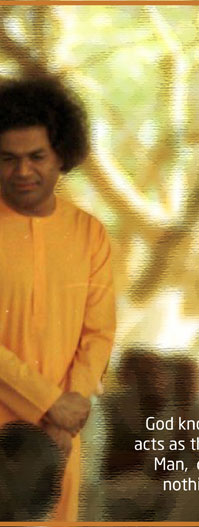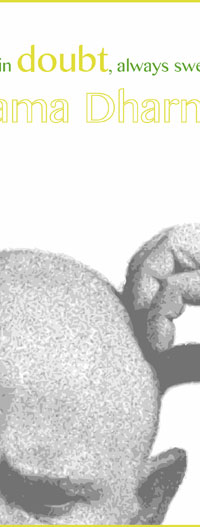|
|
| 'Like' us on Facebook | Follow us: |
Posted on : Sept 09, 2012
MUSINGS ON THE GITA - 04
by Prof. G. Venkataraman
The Bhagawad Gita was delivered by Lord Krishna to the warrior prince Arjuna on the battlefield of Kurukshetra as an antidote to the dilemma that arose in him. It was not a choice between right and wrong, rather it was dilemma between the 'apparently' right and 'absolutely' right. Five thousand-odd years later the wisdom of the Gita is still not lost in context in modern times. In fact it is more relevant and needed now than ever.
No wonder then that when the Lord incarnated again as Bhagawan Sri Sathya Sai Baba He did not fail to emphasise the importance of this spiritual treatise. Apart from giving us an entire volume of commentary on the Bhagawad Gita in the Gita Vahini, Baba also has delivered a number of discourses on this classic text. For instance, during August–September 1984, Baba gave a series of 34 discourses on The Bhagawad Gita inside the Bhajan Hall in Prasanthi Nilayam (these have been aired on Radio Sai several times).
Presently we bring you this musing series by Prof. G. Venkataraman which is on the 'Essence of the Gita'. In this modern age of rationalism we tend to refuse to accept anything that is not offered on the platter of scientific approach. And that is what makes this presentation by an eminent scientist a work of unquestionable relevance. He has infact authored a comprehensive book on the Gita: Conversation Between God and Man, which is popular as much for its profundity as its lucid and simple-to-understand conversational style.
The current series of articles is actually an adaptation of a radio series that was produced and aired on Radio Sai on the request of our listeners. In these episodes too Prof. G. Venkataraman has dealt with the teachings of the Gita in a practical, scientific and thematic manner which makes for interesting reading and easy understanding.
Loving Sai Ram and greetings once again from Prasanthi Nilayam. This is my fourth talk in the series on the Essence of the Gita. Thus far, we have navigated through the second chapter, entitled Sankhya Yoga. I hope you have not entirely forgotten all that I said before.
While dealing with the Sankhya Yoga, I pointed out the following:
 |
 |
 |
Krishna told Arjuna that his difficulty was arising from a lack of sufficient discrimination.
Krishna pointed that the question was not about killing one’s relatives but about whether to do one’s duty or to abandon it.
Krishna continued: “Everyone has duties to perform, and no one is exempt from duties – from kings to paupers to even saints.”
Krishna then turns to the question: “What exactly is duty?” Duty involves actions, and to perform the right action, one must first be clear as to whether the proposed action is based on considerations of the temporary or the permanent.
Recognizing the Nature of the Battle and Choosing the Right side
Krishna told Arjuna that he was trying to decide his course of action on the basis of body consciousness. That meant that Arjuna was giving importance to the temporary. Arjuna was saying he would not fight because his grandfather, Gurus and so on were in the opposing army. Thereupon, Krishna explains that bodies are temporary, born to perish. The issue was not one of Bhishma versus Arjuna but adharma versus Dharma (Unrighteousness Vs Righteousness). As a soldier and warrior, Arjuna had a duty to protect Dharma. Bhishma, etc., were on the side of adharma. That being the case, how could Arjuna chicken out, especially at the very last moment?
All human beings are the embodiments of the Atma, the body being a mere outer dress of sorts. While the body is temporary, the Atma is eternal. Thus, the nature of actions that one performs must be guided by considerations of the permanent or the Atma, rather than of the transient or the body.
 |
 |
 |
In a sense, that is the touchstone one uses to make the correct decision when caught in a moral dilemma. For example, the situation may arise when one might feel that there was an urgent necessity to pay a bribe so as to get something done. On the other hand, paying a bribe amounts to supporting adharma.
One might argue that if the bribe were paid, some good would result. That might be so but the Gita makes it very clear that it is not enough for the ends alone to be good; the means also must be good, as the last sloka proclaims. That is what Mama Dharma is all about – choosing that course of action that is based on considerations of the permanent rather than the temporary. If that is done, there would be no conflict between the means and the ends. Later, I hope to offer many illustrations so that the concept becomes clearer.
So the first point we have to appreciate is that Arjuna’s problem was not one of to fight or not to fight but one of performing an action guided by considerations of the permanent [namely the Atma] rather than the temporary [that is, the body]. The Eternal is God, and actions performed keeping the Eternal in mind would be pleasing to God. Hence, we must always choose that course of action that Swami would approve of, that is to say, actions that are God-oriented.
The question now becomes: “How to find out if Swami would approve of what we are planning to do?” Krishna gave the answer over five thousand years ago. His formula is simple:
Use your power of discrimination, Spiritual Discrimination that is, to check out if your proposed action is desirable or not [in the sense I have explained].
But remember, the faculty of Spiritual Discrimination or Buddhi would not work, if you are in the grip of your internal enemies. That means, internal purity is a must, if Discrimination or Buddhi is to work properly.
This internal purity is what Swami often refers to as Trikarana Suddhi or harmony of thought, word and deed, in the pursuit of goodness. More about this internal purity later.
Role of Sense Control in Decision Making
 |
 |
 |
For the present, let us note that Krishna has stressed the importance of sense and mind control, in order to keep Buddhi in shape. Without the control of the senses and the mind, Buddhi would be blunted. If Buddhi becomes blunt, Spiritual Discrimination would automatically fail. And when that happens, one can easily delude oneself and make all kinds of wrong judgements leading sometimes to great disaster. History is full of examples where this has been proved true.
We are now ready to consider Chapters 3 and 4, dealing mainly with Karma Yoga and some of its aspects. Actually, Krishna gives a brief hint about Karma Yoga in Chapter 2 itself but elaborates further in the chapters just mentioned. Now why is Karma Yoga important? Because it is the practical aspect of Mama Dharma. The headlines as far as Chapter 3 is concerned are the following:
None can remain perfectly inactive; action is inevitable.
However, the action must be meaningful in the sense it must be in the spirit of Karma Yoga; otherwise, it is tantamount to inaction, in a spiritual sense that is. Action must be performed with perfect detachment.
Further, one must accept the position one has been placed in by Destiny, and do the very best one can while in that position, in the spirit of a Karma Yogi.
Karma Yoga is not exactly easy; desire is its main foe, which means that if one aspires to be a Karma Yogi, then one must burn all feelings of desires within.
And now, a quick look at the Slokas related to the headlines above, after which brief comments on them.
Freedom from action is the culmination of Karma Yoga, and that freedom does not come without first entering upon action. Nor can one reach perfection – the culmination of Sankhya Yoga – merely by refusing to act. [3.4] Indeed, none can ever remain inactive even for a moment; for everyone is relentlessly and helplessly driven to action by one’s intrinsic nature or Gunas. [3.5] He who claims to be inactive merely by being motionless but nonetheless broods on sense objects is a deluded fool and in fact a hypocrite. [3.6] On the other hand, superior is he who engages in action but with full control of the mind and the senses. [3.7] Therefore, do thy duty as prescribed; for duty-bound action is superior to inaction. Forget not that action is required even to maintain the body. [3.8] Actions normally fetter the human being but not when they are performed as acts of sacrifice. Therefore, O Kaunteya, act and perform thy duty without attachment and in a spirit of sacrifice. [3.9] Know that all action originates from the Supreme One who is Imperishable and All-pervading. And in all sacrificial action, this Supreme Spirit is consciously present. [3.15] Partha, one who does not revolve with the wheel of sacrifice but seeks instead mundane pleasures through the gratification of the senses lives in vain. [3.16] One’s own duty, though seemingly devoid of merit, is superior to that of another, even if well performed. It is preferable and honourable to do one’s duty; undertaking another’s duty is fraught with danger. [3.35] Desire is the Wise man’s eternal foe, O Kaunteya and is like an insatiable fire. [3.39] |
|---|
So much for the key Slokas and now for some comments.
We hardly realise how important the spirit of Karma Yoga is for the good of society.
The Real Import of Seva
I got a good lesson of that in March 1999, from a discourse that Swami delivered while visiting Delhi. As everyone knows Delhi is the capital city of India, synonymous with politics, government, and government offices galore.
In His discourse, Bhagawan said that seva or service did not mean that one ought to pick up a broom and start sweeping villages. No doubt that kind of work did qualify to be called seva. However, said Swami, doing one’s job properly in the true spirit of Karma Yoga also qualified to be described as seva; in fact, that constituted about 90% of Karma Yoga.
Addressing pointedly the government officials who had come in thousands for Bhagawan’s darshan, Swami said that avoiding work while drawing a salary was a sin. This is very similar in spirit to sloka [3.8].
 |
 |
 |
On the other hand, working sincerely without any concern for the salary received was real seva. It was seva because all government work was in principle directed towards public welfare. Swami added that these days, people draw a salary of ten thousand rupees and do not perform even a hundred rupees worth of work! As one who has had a ringside view of the way the governmental system works, I know how true this is.
Let us reflect on this for a moment. In the old days, government officials in India were known as Public Servants, and with good reason too; they were employed by the people, for serving the people. If, however, the officials come to office, waste their time discussing office politics, and spend the rest of their time currying favour with higher ups, or in making personal phone calls and so on, then is it not a crime against society? What is the point of such people then reporting for Sevadal duty, wearing a scarf and going through some weak motions of alleged seva? In this particular discourse, Swami was sending a clear signal that doing one’s work diligently while at one’s work station and serving society thereby was also seva. Seva is not just wearing a scarf and sweeping villages, as many think it is.
Karma Yoga stresses emphatically that doing one’s duty in the situation destiny places one in life is far superior than seeking some other duty and trying to perform it. I shall give two examples, though they are obvious.
Example one: There is a young couple with a small child. The aged parents of the young man live with the couple. The young couple leave their kid with the elders, asking them to do babysitting and rush off wearing scarves to do seva. Is this real service? Such things are common in high society also. In India, many wives of senior army officers leave their kids with nannies and push off to do social service. Swami has, in the old days, drawn pointed attention to such aberrations, saying such actions spring from an ignorance of what service is all about. They are the result of the lack of proper discrimination.
Example two: There is a doctor who is very money-minded in his profession. Yet, because he is a Sai devotee, he wears a scarf during weekends and attends medical camps. One wonders what exactly his attitude would be while rendering so called service in those camps.
In short, Karma Yoga and Mama Dharma are not really far off from daily life, and we need not imagine that they become relevant only in extreme, crisis situations. As Krishna emphasises, life is a sequence of actions in many of which, the application of discrimination becomes important. And to sharpen the knife of Spiritual Discrimination, the discipline of sense and mind control is vital. A person with good sense and mind control would always be calm, be able to analyse situations dispassionately and take the right decisions. It is because the concept of Karma Yoga is so intimately inter-twined with human life that the Gita has been described as an indispensable manual of life; and that also is why Gandhi constantly consulted it, in relation to almost everything he did.
 |
 |
 |
 |
 |
 |
 |
 |
Adherence to One's Dharma is an Expression of the Innate Divinity
Slokas [3.15] and [3.16] also clarify the place of man in the Cosmos, and the role he is expected to play. Scholars hardly ever draw attention to these slokas, but these assume special importance in the context of some of the discourses of Swami in which He has drawn attention to an important hierarchy that goes from the individual to society to Nature and finally to God. This is a topic that would occupy a lot of our attention later.
Sloka [3.15] tells us that God is the very embodiment of sacrifice. By the way, the lives of the Avatars offer any number of examples of supreme sacrifice, and one really does not have to look beyond Swami for proof. That is point number one. Point number two is that if an individual sacrifices, that act of sacrifice would be in perfect harmony with the Divine Spark within. Point number three which is very important, is Krishna’s specific call that every individual must sacrifice and not abandon that practice.
 |
 |
 |
I shall have more to say about this later but here let me just say that every entity in Nature receives as well as gives. Humans being a part of Nature must do the same but unlike other living species that are hard-wired to maintain the balance between receiving and giving, humans can dodge giving, even while they are receiving.
In other words, they can cheat deliberately. That, says Krishna, is unacceptable. This remark is very important since these days, there is a large amount of cheating going on. By the way, it is interesting to note that out of all the entities in the Cosmos, it is humans alone who are not hard-wired and therefore capable of going against dharma, or their intrinsic nature. A stone, for example, cannot go up a slope on its own. It can only roll down; that is its dharma. Man, however, can create choices, and act according to his fancy; and there starts all the trouble.
Let us move on and now take a brief look at Chapter 4 by focussing on a few crucial slokas relevant to us. They are the following:
He who sees action in inaction and inaction in action is enlightened among men; verily he is a Yogi and one who has done all he need to do. [4.18] The act of offering is Brahman and the offering is Brahman; the one who offers is Brahman and the sacred fire into which the offering is made is also Brahman. He alone attains Brahman who, in all his actions is fully absorbed in Brahman. [4.24] Seek enlightenment by serving and prostrating before illumined souls; and learn through reverential questioning. [4.34] |
|---|
And now for some comments. Let me start with sloka [4.34] that I just quoted. There is an interesting story behind it that goes as follows:
One day when Shirdi Baba was in the Masjid [where Baba usually spent a lot of time], His devotee Nanasaheb Chandorkar was massaging Baba’s legs and at the same time muttering something. A conversation then ensued:
Baba: Nana, what are you mumbling to yourself?
Nana: I am reciting a sloka in Sanskrit.
Baba: What sloka?
Nana: From the Bhagavad Gita.
Baba: Chant it fully.
Nana: Tadviddhi pranipaatena pariprashnen Sevaya,
Upadekshyantim Te Jnanum Jnaninatsattwadarshninah.
Baba: Nana, do you understand it?
 |
 |
 |
Nana: Yes.
Baba: In that case, explain it to Me.
Nana: It means: By prostrating before the Guru, questioning the Guru, serving him, learn what Jnana is …..
Baba: Nana, stop! I do not want this collective translation. Explain the stanza to Me word by word.
When Nana tries to a give word by word explanation of the sloka, Baba chastises Nana at every stage, making Nana look silly. Nana then realised that Baba appearing like an ignorant person was a put-on typical of Avatars.
As Swami sometimes says, man knows nothing but acts as though he knows everything. God, on the other hand, knows everything but often acts as though He knows nothing. That precisely is what happened on this occasion.
Further, Baba explained an important truth. Gurus do not teach Jnana. This might seem strange but the fact is, as Swami has explained, Jnana or Spiritual Wisdom is latent in every human being since every person is an embodiment of the Atma. Jnana comes with the individual right at birth. What happens is that the Guru, through his teachings, removes ajnana or spiritual ignorance. When ignorance is scrubbed away, Jnana, which until then was covered or eclipsed by ignorance, stands revealed.
True Action and True Silence
Let me next consider the sloka that deals with action and inaction. This remark of Krishna is particularly relevant in this Kali Age when everyone seems so very busy and is going around furiously appearing to do this and that. Krishna is telling us that in God’s view, that action alone is worthwhile which is spiritually meaningful. A rich businessman might, for example, be hyper active wheeling and dealing, jetting across continents, being in Melbourne one day and in Moscow on the next, buying up companies, sewing up contracts and whatnot. All this may be good for the tycoon’s business, but since it all springs from the businessman’s ambitions and desire to be rich and powerful, the actions have a low rating in the spiritual world.
On the other hand, there might be a saint who is lost in meditation who thus appears inactive; that would be the worldly view. However, where God is concerned, such a man is highly active. You might ask, “How is that possible when the man is so inactive physically?” Well, I can do no better than cite the example of Ramana Maharishi, whose name must be familiar to many.
Ramana spent most of his life, withdrawing into himself. People would go to his Ashram wanting not only his darshan but with many questions to ask. However, Ramana hardly gave any opportunities for devotees to ask questions; he sat mostly in silent meditation.
One day, a devotee who had camped there for nearly a month and had come with many questions to ask, finally got so frustrated that he broke all the local rules of etiquette and burst out crying, “O Sage, I am waiting here for nearly a month with many questions to ask, questions of vital importance to me, and you are not even bothering to speak to me!”
Ramana opened his eyes and gently replied, “Son, I have already answered all your questions.” The devotee was shocked and muttered, “How can that be? This is the first time you have actually spoken to me. Thus far, you have remained silent!”
 |
 |
 |
Ramana smiled and said, “Silence - that is my answer to all your questions. Silence your mind, and all your problems would be solved.”
That silence that Ramana talks about has been brought to our notice by Swami also with the words, “It is only in silence that the Voice of God can be heard.”
What is this silence that Ramana and Swami are talking about? Not the silence that results when we shut off our vocal chords but silence of the mind, which results in the quelling of thoughts. When the ceaseless chatter of mind comes to a halt, the gentle whisper from within the Heart can always be heard. It is to remind us of this that Bhagawan sometimes gives a diamond ring to a few devotees, adding that the diamond is meant to remind them of the command, DIE MIND!
Now when Swami says ‘die mind’ He really means ‘let your lower mind die’. It is in the lower mind that the famous six enemies hide, constantly trying to lead humans away from the path that leads one back to God. OK, let us suppose that the useless chatter in the lower mind is shut off. What happens then? Very simple. The Voice of God or our Conscience can speak to us via the ‘pipeline’ called Buddhi.
If Buddhi had operated, it would have told Arjuna, “O Arjuna, you are falling into a trap set by the lower mind. You are analysing this war entirely on a worldly basis. No, you must not do that. Remember, before you undertake any action, especially one that might involve questions of ethics and morality, ask yourself a few basic questions like: ‘Is this good or is it bad? Is it right or is it wrong? Is it selfish or is it unselfish?’ Good, right, and selflessness are all based on your permanent aspect, namely the Atma. The other choices are all based on the lower aspect, namely your transient body. Always choose that course of action that is based on the permanent and not on the transient. That should always be your duty. That is your dharma or Mama Dharma.” To be technically correct, the Gita uses the word Swadharma but that is the same as what Swami refers to as Mama Dharma. The Golden Rule thus is: “When in doubt, always swear by Mama Dharma, always. Never ever waver!”
 |
 |
 |
Is it any wonder that Swami repeatedly tells us: “Always follow your Master! Your Conscience is your real Master!” Very true, because what we casually refer to as the Conscience, is really the Voice of the God resident within us. There on the battlefield, Krishna gave a one-time advice to Arjuna. But that same God is also within us, all the time, 24/7. He travels with us wherever we go, to London or Timbuktu or whatever. He never sleeps. Only, we hardly allow Him to speak to us. If only we allow Him to do that!
This leaves me with the famous Brahmaarpanam Slokam [4.24], that we are all supposed to chant before every meal. Basically, it is a reaffirmation of the fact that God is not only everywhere all the time, but in fact God is everything; there is nothing else! This is a profound Truth, and I can hardly do justice to that in this talk since it is time to end. I shall make amends some other time.
In summary, in this talk, I have basically said the following:
Karma Yoga expounded in the Gita is essentially a practical manual for following Mama Dharma.
Action must be meaningful in a spiritual sense; otherwise, it amounts to inaction in the context of Mama Dharma.
We do not have to acquire Spiritual Knowledge; it is already latent in us. However, it is hidden by a thick layer of spiritual ignorance. When that ignorance is scrubbed away, following Mama Dharma becomes easy.
Actions are a must and diverse; but they all become pointless unless they form a part of the fabric of Mama Dharma. A careful study of the lives of various saints would give us plenty of clues about how to convert inaction into spiritually meaningful action.
And in this context, keeping Buddhi sharp is a must.
That is all for now. Jai Sai Ram.






